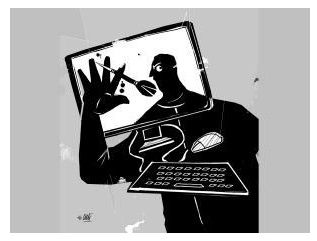
Those of us using mobile phones in Bangladesh, are only too aware of the deluge of unnecessary messages that besiege us on a daily basis. It's not just text messages, there's voice mail too. Some of them are trying to sell ring tones for our mobiles, others offer land, houses, clothes, restaurant meals and so on, at attractive rates. We get these messages from the people marketing products or services because we've provided them with our phone numbers while buying their services.
And so, from time to time, they inform us of their products or services through these messages. But then there are those countless messages we receive every day from companies we probably have had no contact with whatsoever (that'll be over 90% in my case). Naturally the question arises, where do these companies or individuals get our numbers from? Isn't handing over my phone number without my knowledge or my consent, a violation of my privacy?
There are other sources of this hassle. For example, there are the credit card companies or the banks and financial institutions who act as their agents. Depending on the credit limit of the cards, the product and service marketers flood us with messages round the clock. Platinum card holders get offers of package trips to Europe and America, and other such luxury deals. If the credit limit is modest, then the offers are for products and services within the country. The bottom line is, the big companies get to know if I am rich or poor or just plain middle-class. But it does not seem as if we are least bothered about how this occurs and just how far it should be allowed to extend.
Legally speaking, an individual's privacy is a constitutional right and unlawfully violating this, or even attempting to violate it, is a criminal act. The state, of course, has some right to poke their nose into our personal information. That is, the state security forces and law enforcement agencies can ask and receive such information for justified causes and with legal permission. But there is supposed to be a minimum safeguard against the law enforcement agencies misusing this provision for political purposes. Needless to say, such a safeguard is non-existent. In fact, the abuse of those powers by the law enforcement agencies has reached such a height that publicising recorded telephone conversations of politicians, journalists, cricket stars, actresses and businessmen has become regular practice. Known critics of the government are now reluctant to discuss or make comments over the telephone. And politicians of the opposition camp have reportedly been advised not to discuss sensitive issues over the phone.
Bangladesh Telecommunications Regulatory Commission (BTRC) hasn't uttered a word in this regard. It is natural that they will cooperate with various state security agencies, but can that extend beyond legal parameters? It may be pointed out that it is for political reasons that certain persons, groups or agencies tap into telephone conversations, or monitor internet communications, in violation of citizens' rights to privacy. We are not likely to be freed any time soon from this political propensity to demean rivals. After all, BTRC is supposed to be accountable to parliament, but no one will really bother to give any account of anything to this 'unelected' parliament, bereft of the opposition.
There is a reason for beginning this piece with the mobile phone context. According to the BTRC website, in April the number of internet users in Bangladesh exceeded 4.5 crore (45 million). Of them, 4.42 crore were mobile internet subscribers. Many of them may be using laptops or PCs, but the connection is through the mobile network. Whatever the case may be, the government has come to the conclusion that the existing law is not enough to control the use of internet, and so they are drawing up a new cyber act. In the age of an 'unelected' parliament, the government's wish is the last word. It is no secret that the public survey initiative is mere eyewash to avoid criticism. The government carried out similar public opinion surveys in the past, regarding laws and policies, but public opinion remained totally overlooked. The minimum marriageable age for girls is a glaring example of this.
One can accept it if the government, with justified cause and legal authorisation, delves into our emails and social communication networks. But what can't be accepted is abuse of power in the name of action against terrorist threats or anti-state terrorism. Satirical cartoons on politicians is an intellectual practice, accepted as freedom of expression around the world. But in our country, any satirical sketch or parody about the leadership in power, means a ticket to jail. Now there is a proposal for the new cyber law to prohibit anything 'harmful' against foreign friendly nations to be posted on social media websites. Say, for example, I am against the Rampal power plant, in the interests of protecting the Sundarbans. I believe that the project will suck the oxygen from our lungs and leave our natural environment in ruins. But as a state company of a friendly nation is involved in the project, what is to be done if our political authorities see my views regarding the Rampal project as a cyber crime? The new cyber law proposes that the security forces can break down doors and windows to enter our homes.
While the government here proceeds to make this law stricter than ever, the UN is holding the annual session for its human rights council in Geneva. At the session it was clearly stated that, some governments view the internet as the enemy. But any attempt to block entry to the worldwide web is a violation of fundamental human rights. David Kaye, UN Special Rapporteur on the promotion and protection of the right to freedom and expression, on 18 June told the UN Human Rights Council, criminals may take advantage, but despite this risk, the privacy of the online users must be protected.
The issue of protecting privacy becomes even more important when bloggers and members of the minority community are harassed more in the digital world than in the real world. In this regard, David Kaye called upon the governments to promote encryption of information on internet users. This will facilitate the identity of internet users to remain confidential. Many civil rights activists, journalists, teachers and researchers use this method. But government oppose encryption, saying that enables criminals and terrorists to bypass security forces. David Kaye said he wasn't against security forces monitoring or investigating internet users' personal information, but that would have to be with approval of the law.
Former agent of the US National Security Agency, whistleblower Edward Snowden, revealed that western governments, particularly the US and the UK, had been pressurising computer companies to add unobtrusive devices to computers so that they could secretly monitor all online activities of the users. David Kaye opposed such initiatives, saying that if the computer companies were forced to include systems to collect data of the users, then oppressive governments would misuse this facility.
We do not know if our government has forced the manufacturers of computers used in this country to include such a system. But there are many instances where online Skype conversations have been recorded and revealed, with political intent.
The government has a strong argument, that there is no alternative but to adopt such measures in order to tackle the threat of terrorism. We are aware that our security forces have been quite active in their efforts to procure equipment with advanced technology from various countries. We also know that Privacy International, a civil rights organisation, got the Swiss government to stop RAB's initiative to procure such equipment. The rights organisation opposed the handover of such equipment, pointing out the human rights violations by Bangladesh's security forces.
Referring to the strategies and requirements of the security forces in tackling terrorism, the UN rapporteur David Kaye said, the apprehensions projected about use of the internet by terrorists is not consistent with reality. He said that when the house where Osama bin Laden had been hiding was searched, a few pen drives were found. A messenger would deliver these by hand. Terrorists are not so stupid as to imagine that internet communications would remain secret. David Kaye called for a global consensus to recognise protection of a person's online private and freedom of expression as a human right. It is unacceptable if new intrusive laws are introduced in our country, sidestepping this debate. We too want freedom of expression in the cyber world and the right to privacy. We do not want to be victims of militants for our blogs, but at the same time, we cannot accept the process of the state moving more and more towards autocracy.
Kamal Ahmed is a journalist.



